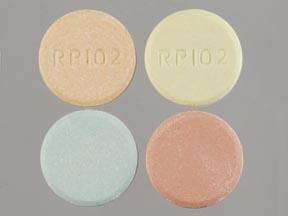Calcium carbonate
Generic name: calcium carbonate [ KAL-see-um-KAR-boe-nate ]
Brand names: Alka-Mints, Alka-Seltzer Cool Action Heartburn Relief, Alka-Seltzer Extra Strength Heartburn Relief, Calcium Oyster Shell, Cal-Gest,
... show all 66 brands
Dosage forms: oral suspension (1250 mg/5 mL), oral tablet (1250 mg; 600 mg; 648 mg), oral tablet, chewable (1000 mg; 1177 mg; 500 mg; 600 mg; 750 mg; 850 mg)
Drug classes: Antacids, Minerals and electrolytes
What is calcium carbonate?
Calcium is a mineral that is found naturally in foods. Calcium is necessary for many normal functions of the body, especially bone formation and maintenance.
Calcium carbonate is used to prevent or to treat a calcium deficiency.
There are many brands and forms of calcium carbonate available. Not all brands are listed on this leaflet.
Calcium carbonate may also be used for purposes not listed in this medication guide.
Calcium carbonate side effects
Get emergency medical help if you have signs of an allergic reaction: hives; difficulty breathing; swelling of your face, lips, tongue, or throat.
Calcium carbonate may cause serious side effects. Call your doctor at once if you have:
-
little or no urinating;
-
swelling, rapid weight gain; or
-
high levels of calcium in your blood--nausea, vomiting, constipation, increased thirst or urination, muscle weakness, bone pain, confusion, lack of energy, or feeling tired.
Common side effects of calcium carbonate may include:
-
upset stomach, gas; or
-
constipation.
This is not a complete list of side effects and others may occur. Call your doctor for medical advice about side effects. You may report side effects to FDA at 1-800-FDA-1088.
Related/similar drugs
Warnings
Follow all directions on your medicine label and package. Tell each of your healthcare providers about all your medical conditions, allergies, and all medicines you use.
Before taking this medicine
Ask a doctor or pharmacist if it is safe for you to take calcium carbonate if you have ever had:
-
kidney disease;
-
a parathyroid gland disorder; or
-
high levels of calcium in your blood.
Ask a doctor before using calcium carbonate if you are pregnant or breast-feeding. Your dose needs may be different during pregnancy or while you are nursing.
How should I take calcium carbonate?
Use exactly as directed on the label, or as prescribed by your doctor. Do not use in larger or smaller amounts or for longer than recommended.
Check the label of your calcium carbonate product to see if it should be taken with or without food.
Swallow the calcium carbonate regular tablet with a full glass of water.
The chewable tablet should be chewed before you swallow it.
Shake the oral suspension (liquid) well just before you measure a dose. Measure liquid medicine with the dosing syringe provided, or with a special dose-measuring spoon or medicine cup. If you do not have a dose-measuring device, ask your pharmacist for one.
Use the calcium carbonate powder as directed. Allow the powder to dissolve completely, then consume the mixture.
Calcium carbonate may be only part of a complete program of treatment that also includes dietary changes. Learn about the foods that contain calcium.
Your calcium carbonate dose may need to be adjusted as you make changes to your diet. Follow your doctor's instructions very closely.
Store at room temperature away from moisture and heat. Do not freeze.
What happens if I miss a dose?
Take the missed dose as soon as you remember. Skip the missed dose if it is almost time for your next scheduled dose. Do not take extra medicine to make up the missed dose.
What happens if I overdose?
Seek emergency medical attention or call the Poison Help line at 1-800-222-1222.
What should I avoid while taking calcium carbonate?
Ask a doctor or pharmacist before taking any multivitamins, mineral supplements, or antacids while you are taking calcium carbonate.
What other drugs can affect calcium carbonate?
Calcium can make it harder for your body to absorb certain medicines. If you take other medications, take them at least 2 hours before or 4 or 6 hours after you take calcium carbonate.
Other drugs may interact with calcium carbonate, including prescription and over-the-counter medicines, vitamins, and herbal products. Tell your doctor about all your current medicines and any medicine you start or stop using.
More about calcium carbonate
- Check interactions
- Compare alternatives
- Pricing & coupons
- Reviews (20)
- Drug images
- Side effects
- Dosage information
- During pregnancy
- Drug class: antacids
- En español
Patient resources
- Calcium patient information
- Calcium Carbonate Capsules and Tablets
- Calcium Carbonate Chewable Tablets
- Calcium Carbonate Chewable Tablets (Antacid)
- Calcium Carbonate Tablets (Antacid)
- Calcium Carbonate Suspension
Other brands
Caltrate, Tums Regular Strength, Tums Extra Strength 750, Tums Chewy Bites, ... +21 more
Related treatment guides
Further information
Remember, keep this and all other medicines out of the reach of children, never share your medicines with others, and use this medication only for the indication prescribed.
Always consult your healthcare provider to ensure the information displayed on this page applies to your personal circumstances.
Copyright 1996-2025 Cerner Multum, Inc. Version: 9.01.

